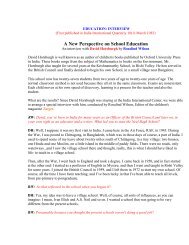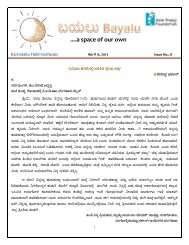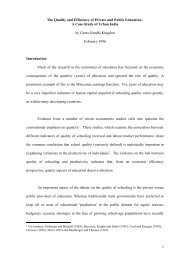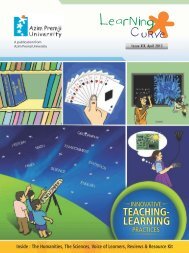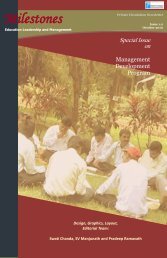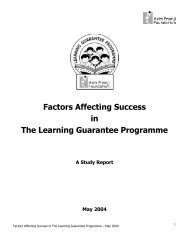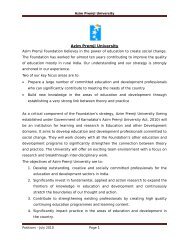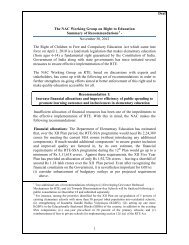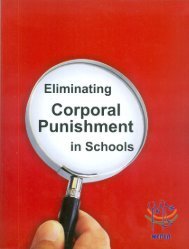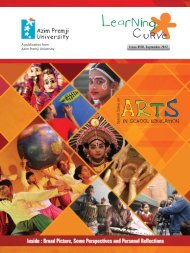Language and Language Teaching, Issue 2 - Azim Premji Foundation
Language and Language Teaching, Issue 2 - Azim Premji Foundation
Language and Language Teaching, Issue 2 - Azim Premji Foundation
Create successful ePaper yourself
Turn your PDF publications into a flip-book with our unique Google optimized e-Paper software.
There was a lot of resistance, but it was notagainst English alone. Several quarters launchedmassive attacks against issue-based curriculum,<strong>and</strong> the critical approach it envisaged. TheGovernment of Kerala democratically tackledthe debate <strong>and</strong> the polemics that were generatedin the state. However, since there was a highlymotivated <strong>and</strong> convinced group of peopleworking with me, I could face the criticism withease. Besides, those who criticised were notready for any intellectual debate; nor did theypropose any alternatives.PKJ: How far have your ideas beenincorporated in the current English textbooks ofthe state level schools in Kerala? Are you happywith them?KNA: I am happy with the textbooks, thoughthere are certain areas that need to be revisited.In any case, no textbook should run for morethan five years. Besides, I do not fully endorsetop-driven models; models must be evolved atthe bottom level with the ownership of theteachers, the people, <strong>and</strong> the community ingeneral.PKJ: In spite of an increasing acceptance ofsome of your ideas in the Kerala academia,there is a lot criticism of the books that havebeen produced under your guidance. You havebeen accused of idealism, <strong>and</strong> not underst<strong>and</strong>ingthe reality of Kerala. How do you respond tothese criticisms?KNA: I have been criticized for being adreamer <strong>and</strong> an idealist. In a democracy, anyonewho initiates a change will be criticized. As Iam a student of critical pedagogy, I think thateven my models should be critically examined.At the same time, no one can ignore the changesthat have been taking place in the field.PKJ: Your popularity has led the AndhraPradesh State Council of Educational Research<strong>and</strong> Training (SCERT) to seek your guidance inpreparing their English textbooks. Could you tellus the extent to which the curriculumdevelopment <strong>and</strong> textbook preparation teamshave accepted your theoretical underst<strong>and</strong>ing?Have you experienced any contextualconstraints, or diluted your position?KNA: I have worked for the curriculum <strong>and</strong>textbook revision of SCERT Andhra Pradesh,with experts such as Rama Kant Agnihotri <strong>and</strong>A. L. Khanna. I personally believe that therevised textbooks of Andhra Pradesh havemoved away from skill-based pedagogy todiscourse-based pedagogy.PKJ: How do you wish to carry out your agendaat the national level?KNA: There are a lot of challenges ahead ofus. I underst<strong>and</strong> that similar initiatives are takingplace across the world. There are market-drivenforces that work for corporate dem<strong>and</strong>s ineducation. There are also forces that promotelinguistic imperialism. I join h<strong>and</strong>s with all thosewho work against these forces.P. K. Jayaraj is an ELT expert at the RegionalInstitute of English, South India, Bengaluru. He hascontributed to the development of the statecurriculum, <strong>and</strong> the production of text books inEnglish for the States of Kerala <strong>and</strong> Andhra Pradesh.He has published three books in English forMathrubhoomi publications. They are: Say What YouMean, Grammar <strong>and</strong> Grammar Wars, <strong>and</strong> WhenWords Bloom.pkjayarajs@gmail.com<strong>Language</strong> <strong>and</strong> <strong>Language</strong> <strong>Teaching</strong> Volume 1 Number 2 July 2012 42



